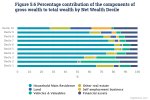If you are aged 65 and planning your finances, you should not have investments in a life fund under current rules. Your gains will be subject to exit tax.
If you have the same amount directly in a portfolio of shares, the capital gains will disappear on death.
This strategy may change if the government changes the rules but for now, this is the correct strategy.
"Correct" is subjective to the individual.
Does the retiree have the knowledge and skills to replicate the index tracking fund in their share portfolio? Is the fee for the shares the same or lower than the equivalent fund charge? If "no" to either or both the retiree is straight away reducing their expected net return to a level which
may very well eliminate any benefit of the tax advantage.
Over 20 years in retirement every percentage point difference in net return makes a big difference. A larger slice of a smaller pie may not be bigger than a smaller slice of the larger pie.
I don't have the knowledge and skills to replicate an index tracker and neither do i particularly want to acquire those skills. I'm guessing a professional would charge significantly higher fees to replicate a tracker through direct holdings as compared to just buying the tracker fund.
There's a cost to both options of holdings shares directly or investing in an index fund. Not all of the cost is financial- my preference for an index fund is partly because it's a fire and forget decision.
My "correct" is not the same as your "correct". That doesn't mean either of us is actually wrong.
Additionally, i don't have any real problem with an exit tax on the gains, whether it's payable by me or my estate when I die. Because it's on the
gains. I won't have worked hard for that money, I'll have sat there and watch it grow so I'll be fine with the growth being taxed. And my dependents will have done absolutely nothing to earn it- if they consider it anything more than a bonus then frankly I'll have made much bigger mistakes than choosing one investment vehicle over another.
